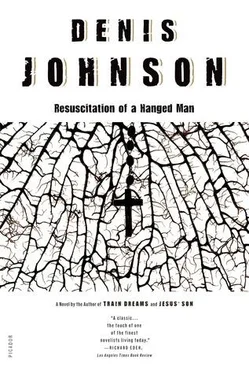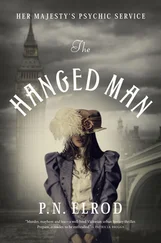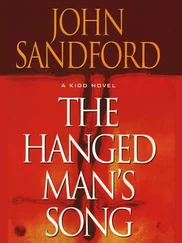“Jesus!” A couple of the others laughed.
As for Ralph, English noticed he wasn’t laughing. Ralph was staring at the three of them with loud, blind eyes, smoothing his mustache with a finger.
When Happy Hour was over, English stepped out into the blue dark, and wouldn’t you know he’d be coming down the road at that moment?
English had seen him dead by the side of the street. He’d seen him lighting a cigarette at the bottom of an alley, zipping himself up in a urinal, passing out and going down and being trampled at a riot.
It was the guy, the geek, the one who’d dressed in loud checkered pants and worn a wig to work and made a fool of himself and lost everything.
He was bent over nearly double and dragging his shadow behind him. It scraped enormously over the road, turning a deep furrow in his life. He got closer and closer. Then he was right on top of English, he was going to crush English to death. And suddenly English couldn’t find him anywhere.
He slept in the car by the side of the road and woke up he didn’t know when. The world was dark and moonless. The night was upside down. He turned on his headlights and engaged the engine, and a series of images began dissolving toward him, faded white lines snaking down the window in a frame of evergreen boughs. Far ahead one other light bobbed slowly on the waters of the darkness. Then the light grew into a symbol, the symbol into a word, and the word was MARY, blinking in the window of a diner. The counter stretched across the window, and a woman stood behind the counter brushing a rag across the surface with one long, sorrowful gesture. English wasn’t hungry, but he went inside anyway. He didn’t know where he was.
Inside, the neon sign — the word MARY with its apostrophe and s extinguished — buzzed loudly.
“Good morning,” English said.
“Can I get you some coffee?” the woman said. Her uniform was sky-blue. Her hair was as short as a boy’s, and she was thin, no less so than a carnival freak. Her skin, stretched over tendons and bones, had the delicacy of rice paper. It looked as if all you had to do was apply a lighted match to make her ready for the grave. She gave him coffee though he hadn’t answered her. She laid a menu on the counter.
“I was going to Franconia, on 93,” he said, “but I think maybe I’m all turned around.”
“You’re on Route 1,” she said.
“I’ve been going north.”
She shook her head slowly. “Go south.”
“It feels wrong to turn around now,” he said.
“It’s the only way I know of. You’ll never get where you’re going by just going on and on north. You’ll never get there.”
She was leaning on the counter with both hands. It was all he could do to keep from touching those hands, those fingers of an ivory sadness, outspread on either side of his heavy white mug.
“Simone,” he said.
He believed he’d never seen anyone stand so still. He had to cover his face with his hands to keep his eyes from beholding her.
“Franconia, you said, didn’t you? Simone … I can’t tell you. I don’t know.” She laid one finger on the menu and moved it toward him an inch. “Eat.”
He reached Franconia well before noon. It was just a string of motels, a big white church, and a field of wet yellow grass in a valley a little way off Interstate 93. The clouds moved behind the white steeple. He’d seen that very thing in a lot of movies. It made him dizzy when it happened in the movies and it made him dizzy now.
He stopped the car and rubbed his eyes.
Before he did anything further he was going to collect himself. He went into the large white church, Our Lady of the Snows, overlooking the yellow field. It was unreasonably dark inside, and he just sat for a few minutes amid the stale whiff of censers and the little musk of the ranks of votive candles, his arms wrapped around himself, until he had to admit that it was just no use — he was only sitting here hugging himself in still another of his faith’s innumerable churches named for saints and ladies. As his eyes adjusted to the dimness he began to feel dominated by the blank stares of the plaster martyrs. Our Lady was no longer a nurturing mother but an enchantress — a shimmering goddess — no more a present comfort but a tantalizing absence. What ark would he sail, what chariot, with what wings, how could he reach her?
No use. Cold silence for his morning prayer.
He found the Notch Lodge at the far end of town — five cabins surrounded by a carpet of pine needles, right on the main road. It was still closed, and English couldn’t tell which cabin served as office, but a man chopping wood beside the house next door, an immense, hairy person in overalls, called to him, “Can I help you out, there?”
English approached him carefully; meanwhile, the man sundered a huge round into seven pieces of firewood with six blows of his maul. The sound of it echoed off the mountain about a half a mile across the field. After each swing he said uh, or shit, or mother fucker .
“I wanted to talk to whoever runs the motel there. Do you know them?”
“Sure,” the big man said. “Mrs. Vance runs it.” He split the last of the round: Bitch.
“Do you know her?”
“Yeah. I’m Mr. Vance.”
“Oh,” English said. “How do you do?”
“Well, I do great. But I don’t do much. I have nothing to do with the motel. I mostly chop wood.”
He demonstrated by shattering another round, causing English to step backward in alarm. “I’m an investigator,” English told him, nearly pleading. “Leonard English. It’s a missing-persons case.”
“Nobody missing around here, I wouldn’t guess.” Breathing heavily, Vance wiped a forearm across his face and set his maul aside.
“I guess a lot of people come and go. Lot of tourists and so on around here.”
“In the summer, yeah. The skiers go over by North Conway in the winter.”
“What about people who aren’t exactly tourists? Other groups, like.”
“Other groups,” Vance said.
“Well, have you ever heard of the Truth Infantry? It’s supposed to be kind of a secret paramilitary group,” English said, embarrassed by his own lack of tact, “located somewhere around here.”
“What’s secret about the Truth Infantry? I’m a member myself.”
“Oh,” English said, finding no other words.
“We just get together in the summer and shoot at targets, mostly.”
Vance sighted down the length of an invisible weapon.
“I’d been given the idea,” English said, “that it was much more serious.”
“We have barbecues and get seriously wasted.”
“That it was sort of a radical underground thing,” English insisted.
“We don’t drink and shoot,” Vance assured him. “We shoot in the morning, then we drink.”
“That’s fine, that’s a sensible way to approach,” English said dizzily, “the whole endeavor.”
“Folks who have a little Vietnam in our background.”
“Yes. Right.”
“We need the fellowship. It’s kind of healing.”
“Right. Right.” English sighed. Had he been brought here as some kind of practical joke? I played it on myself, he thought. “And what about a headquarters. Do you have a building or something?”
“We use this old forestry camp up the mountain. As long as we police it up afterward, everybody’s happy.”
“And there’s nothing secret about it.”
“You knew about it, didn’t you? If it was secret, would you know about it?”
On the left was a massive pile of what appeared to be birch rounds. To the right was a pile of split birch, its meat green and wet, and between the two piles stood the woodcutter Vance with his several heavy tools and the unattainable simplicity of his task. “I suppose I better tell you the investigator I work for is a friend of yours,” English said at last, “Ray Sands. You knew he was dead, I guess.”
Читать дальше












